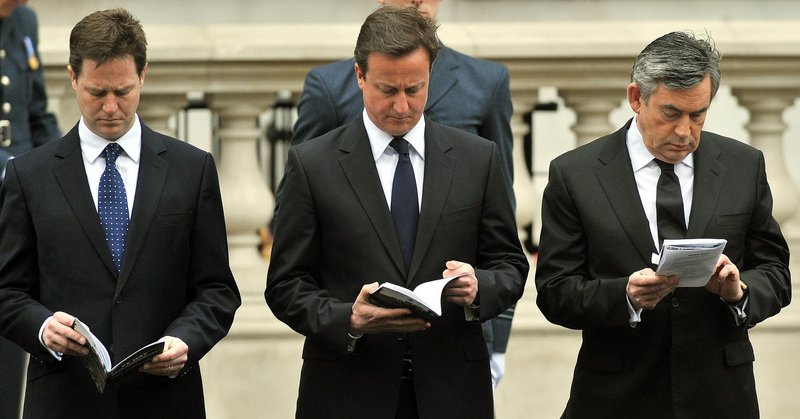LONDON – The two parties that could form Britain’s next government held hours of closed-door talks Sunday without reaching a power-sharing deal, and there are fears that the political uncertainty could stoke market jitters when trading reopens today.
Conservatives and Liberal Democrats have a “mountain to climb” on issues including electoral reform, a senior member of the Liberal Democrats said.
The Liberal Democrats want Britain to shed a system that gave them just 9 percent of the seats in Parliament after they won 23 percent of the popular vote, but if Conservatives give in, it could leave them at the smaller party’s mercy in future elections.
The divide could offer an opening for Prime Minister Gordon Brown’s Labour Party to stay in power through a coalition with the Liberal Democrats and some smaller parties.
Liberal Democrat leader Nick Clegg met with Conservative leader David Cameron on Sunday night, after meeting Brown during the afternoon for what a Liberal Democrat party spokesman said was an “amicable discussion.”
A deal must be brokered soon to calm financial market anxieties about Britain’s economic stability.
“We’re very conscious of the need to provide the country with a new stable and legitimate government as soon as possible,” Conservative foreign affairs spokesman William Hague told reporters.
After six hours of negotiations, Hague emerged to announce that the parties agreed that they should focus on economic stability and reducing the ballooning budget deficit. More talks were planned today, he said.
The prospect of days of political horse-trading has fueled anxiety in financial markets already unsettled by the Greek debt crisis.
Fears that an unstable government could delay Britain’s ability to tackle a record deficit dragged the FTSE 100 share index 2.6 percent lower Friday, while the British pound was sharply down at $1.4720.
“With the markets being highly nervous and fragile in the wake of the Greek crisis and in the mood to penalize any country that is perceived to be falling short on its deficit reduction needs, it is of paramount importance that a credible commitment on how to tackle the dire UK public finances is in place sooner rather than later,” said Howard Archer, chief UK and European economist at IHS Global Insight.
Cameron’s right-of-center Conservatives won 306 of the 650 seats in the House of Commons in Thursday’s national election but fell 20 votes short of a majority. For the first time since 1974, voting resulted in a “hung Parliament” — no party is able to take overall control of the country.
Cameron is now hoping to woo the center-left Liberal Democrats, who finished in third place, with 57 seats. Labour finished with 258.
Conservatives and Liberal Democrats are likely to find some common ground on issues including the economy and taxes, but voting reform and foreign policy have been sticking points in the power-sharing talks.
Britain’s voting system is based on races in individual districts, as it is in U.S. congressional elections. Clegg wants a system common in continental Europe in which parties win seats in proportion to their share of the total vote — a system that is much less likely to put one party in a dominant position. The Conservatives fear such reforms would leave the Liberal Democrats holding the balance of power indefinitely.
Former Liberal Democrat leader Paddy Ashdown told the BBC that although the dialogue between the parties was congenial and respectful, “that isn’t enough because there is a mountain to climb here.”
“I don’t believe that anybody can now establish a new government who is deaf to the calls from the British people for reform to our political system, and part of that is electoral reform,” Ashdown said.
Copy the Story Link
Send questions/comments to the editors.



Success. Please wait for the page to reload. If the page does not reload within 5 seconds, please refresh the page.
Enter your email and password to access comments.
Hi, to comment on stories you must . This profile is in addition to your subscription and website login.
Already have a commenting profile? .
Invalid username/password.
Please check your email to confirm and complete your registration.
Only subscribers are eligible to post comments. Please subscribe or login first for digital access. Here’s why.
Use the form below to reset your password. When you've submitted your account email, we will send an email with a reset code.